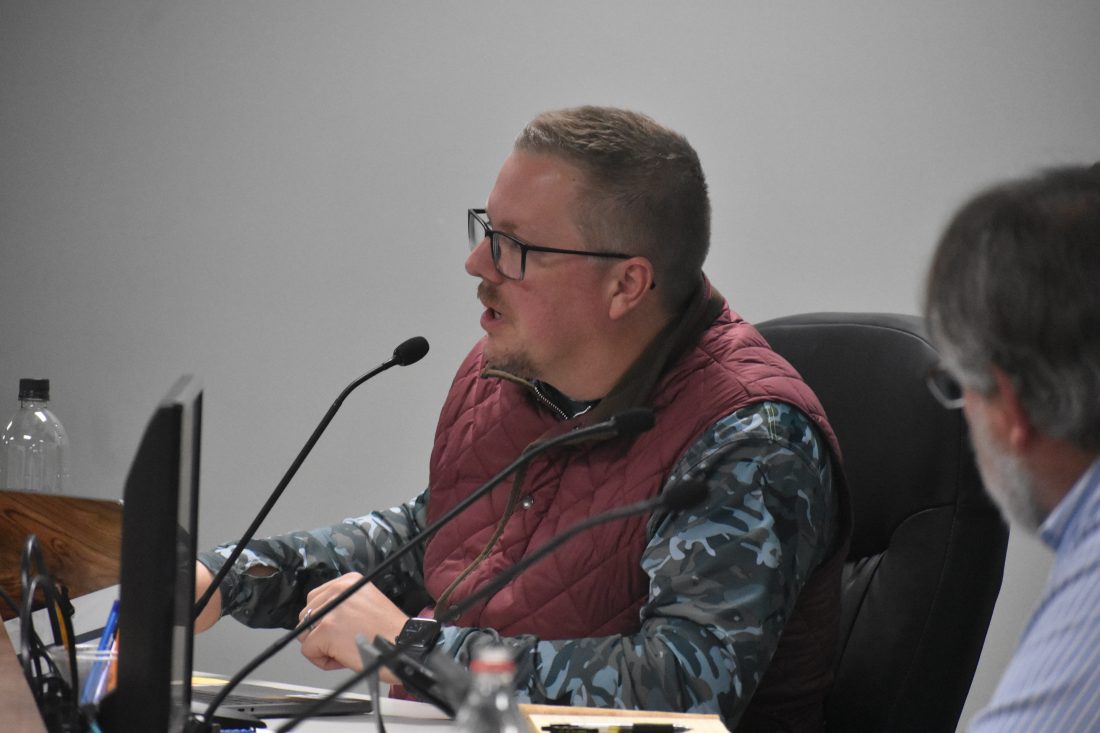Council pledges $250,000 to Trails project | News, Sports, Jobs
T-R PHOTOS BY JOE FISHER — Councilor Jeff Schneider speaks in support of the city pledging funds toward the Iowa River’s Edge Trail project, helping Trails Inc. apply for a grant from the state.
The Marshalltown city council made a motion which could speed up work on the Iowa River’s Edge Trail project during its regular meeting on Monday night, approved a pledge of $250,000 from council-designated Local Option Sales Tax to Trails Inc.
This will allow Trails Inc. to reach a 60 percent funding threshold to apply for a Destination Iowa Grant. The grant would cover the remaining 40 percent of the project.
On April 6, Gov. Kim Reynolds announced $100 million in American Rescue Plan Act (ARPA) funding to support tourism and significant related projects.
Trails Inc. and the city have $550,000 to pave an estimated 1.8 miles of the Iowa River’s Edge Trail between two bridges. With the council’s $250,000 pledge, Trails Inc. will be responsible for contributing the estimated $40,000 remaining to reach 60 percent funding.
“It’s a great opportunity in the short term. It gets us probably one or two years closer to getting to Albion,” said councilor Jeff Schneider. “That’s where it really gets momentum going. It’s going to be a nationwide trail and this is a great opportunity for us. I think we would be foolish to pass this up.”
City Administrator Jessica Kinser said the city will need to put its plans for an urban tree fee on hold because it must appear on a ballot for a vote.
The bridge replacement portion of the project is planned to be in construction in 2023.
Councilor Mike Ladehoff made a motion to pledge $250,000 to the project on the condition that if the grant is not received the funds would come back to the city. The motion passed with councilors Gary Thompson and Al Hoop voting against it.
Riverview Park concept shared
Improvements to Riverview Park are coming closer to reality.
Casey Byers, a landscape architect with Bolton and Menk, shared concept renderings of the proposed facelift with the city council on Monday. The graphics featured the lagoon becoming a greatly expanded detention pond, event space and options for driving through the park.
“There’s a lot of beauty out in this park. It has that connection back to nature,” Byers said. “When we started on this project we wanted to understand that history and what makes Riverview Park unique.”
The lagoon expansion into an estimated nine-acre detention pond would help prevent flooding of the park and become a potential fishing spot. Byers noted the water mass would be large enough for kayakers to use. He said he has spoken with public works director Heather Thomas about making the pond deep enough to keep fish year round.
The park’s tree population has been surveyed by the team with the intention of saving mature trees and removing dead ones. Byers said areas of tree removal and preservation were mapped out with a drone flyover.
Public input has become a large part of this project, according to Byers, and as a result, concept plans include festival grounds to host public events and improvements to the dog park and campgrounds.
Schneider wondered how the disc golf course would be treated in the improvement process, citing the course’s reputation as one of the state’s best. Parks and Recreation Director Geoff Hubbard said a special meeting was held specifically about the disc golf course, which several avid disc golfers attended.
“They will definitely be involved in the process of this new course layout,” he said.
Based on the usage of the campgrounds, the number of recreational vehicle and tent sites would be reduced, but the sites would be beautified. There would be 31 RV sites and five tent sites, and all RV sites would be powered.
On a busy weekend, Hubbard estimated about 30 to 40 percent of the existing 80 campsites are used. There are rarely more than two tent sites used.
In other business
The city is setting aside the adoption of an urban tree fee, which was discussed at a council meeting on March 28. The fee was suggested as a possible new revenue source at a council meeting in January. In March, the council moved to enact a $1.50 per month fee to all Water Works accounts.
City administrator Jessica Kinser said the city’s attorneys with Lynch Dallas found an issue with the proposed fee.
“The word that was problematic with them was ‘utility’ and what you can establish as a utility,” she said. “With a few different go-arounds, there doesn’t seem to be any way to get around the word ‘utility’ and tie it back to Iowa code.”
For the city to adopt the urban tree fee, it will need to appear on a ballot and voted on by the public. There are two opportunities for the item to be voted on this year: a special election in September or the midterm elections in November. A special election would cost the city more than $6,000.
Kinser said she is hesitant to include the urban tree fee on the November ballot because local option sales tax is already up for a vote.
“I would not want to jeopardize what we have going on with local option sales tax,” she said.
Thompson motioned to include the tree fee on the November ballot. The motion received a second but failed.
Kinser clarified the compost fee, which the council also voted in favor of at $1.50 per month, can move forward on July 1.
“I don’t think it’s good to have the same ballot. There’s too much noise out there and people won’t know what they’re voting for,” Schneider said.
Council member Gabe Isom motioned to remove language referring to the urban tree fee and bring the item back for discussion at a later date. The motion passed.
- T-R PHOTOS BY JOE FISHER — Councilor Jeff Schneider speaks in support of the city pledging funds toward the Iowa River’s Edge Trail project, helping Trails Inc. apply for a grant from the state.
- City Administrator Jessica Kinser said the city will need to put its plans for an urban tree fee on hold because it must appear on a ballot for a vote.







